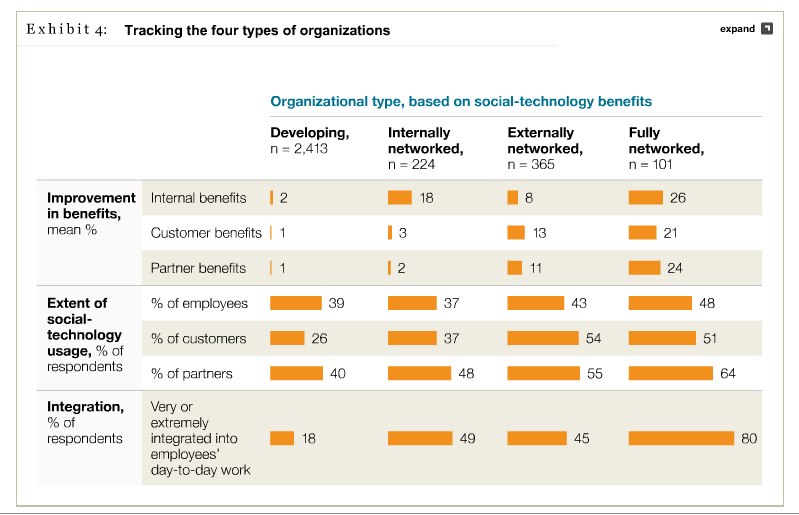 NEWS
NEWS
 NEWS
NEWS
 NEWS
NEWS
McKinsey and Compay issued its fifth annual report about the use of social technologies in the enterprise. The results show how the most networked organizations perform better financially, are taking market share, and blurring the boundaries of their internal and external operations.
![]() McKinsey surveyed 4,200 global executives about how organizations deploy social technologies and the benefits they confer. The results are similar to last year, which found that when “adopted at scale across an emerging type of networked enterprise and integrated into the work processes of employees, social technologies can boost a company’s financial performance and market share.”
McKinsey surveyed 4,200 global executives about how organizations deploy social technologies and the benefits they confer. The results are similar to last year, which found that when “adopted at scale across an emerging type of networked enterprise and integrated into the work processes of employees, social technologies can boost a company’s financial performance and market share.”
But there is a twist here. It’s really hard to scale. And the ones that do not make the leap to a fully networked organization can slip back and not realize the full potential of what social technologies can do for the organization.
The report makes it clear that social technologies have reached critical adoption. Seventy-two percent of the respondents report that their companies are deploying at least one technology, and more than 40 percent say that social networking and blogs are now in use.
![]() The most networked organizations see benefits from interactions with employees, customers, partners and suppliers. By far, though, the largest group are what McKinsey calls the developing organizations, which are using social but not nearly at the scale that brings the most benefits.
The most networked organizations see benefits from interactions with employees, customers, partners and suppliers. By far, though, the largest group are what McKinsey calls the developing organizations, which are using social but not nearly at the scale that brings the most benefits.
The most networked organizations are what McKinsey calls extended enterprises. Their use of social technologies in customer and partner outreach blurs the boundaries of the organization.
Companies that use social tools showed increased market share. They use social tools to scan external environments. They also use the tools to match employees to tasks.
Significant effort is needed to achieve network scale. Many organizations adopt social technologies but then stagnate. The danger is apparent. Workers who decrease use of social technologies are more likely to see their companies backslide.
The most networked organizations believe social technologies will affect business processes. This depends in part on cultural conditions in the organization. It may even lead to entirely new ways of doing work.
The most networked of companies will continue to realize competitive gains. Senior executives need to look at how social technologies affect business processes and foster ways to navigate and form strong links with customers and vendors.
Companies that do not continually innovate with the use of social technologies can end up faltering as shown in the results from McKenzie. Here’s McKenzie’s last piece of advice:
Integrating Web technologies into the daily workflow, our results suggest, is the most effective way to maintain competitive position or become more networked.
Companies should prepare for more substantial disruptions. Since many executives believe that significant changes will occur as (or if) constraints on social tools and technologies are lifted, companies that can create change themselves—instead of reacting to it—are likely to benefit the most.
Social technologies do a lot of things. Most of all, they open peoople to new ways of thinking about who they are and the role of the organization in the market. But to truly differentiate, companies need to find ways to use social technologies for connecting internally, with customers and the channel. Do that and the successes will show on the bottom line and in people’s performance.
THANK YOU